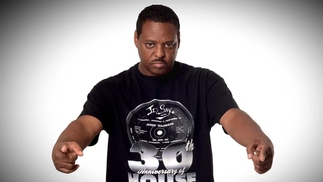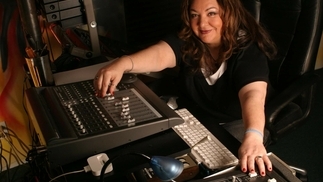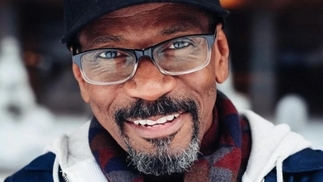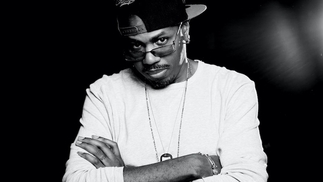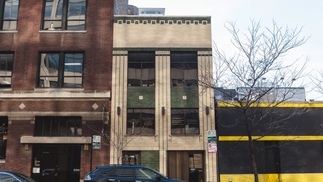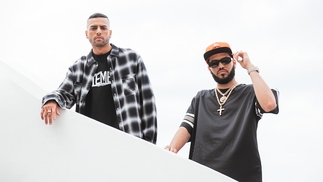Q&A: SNEAK, FARINA & CARTER
Chicago trio on their b2b2b tour
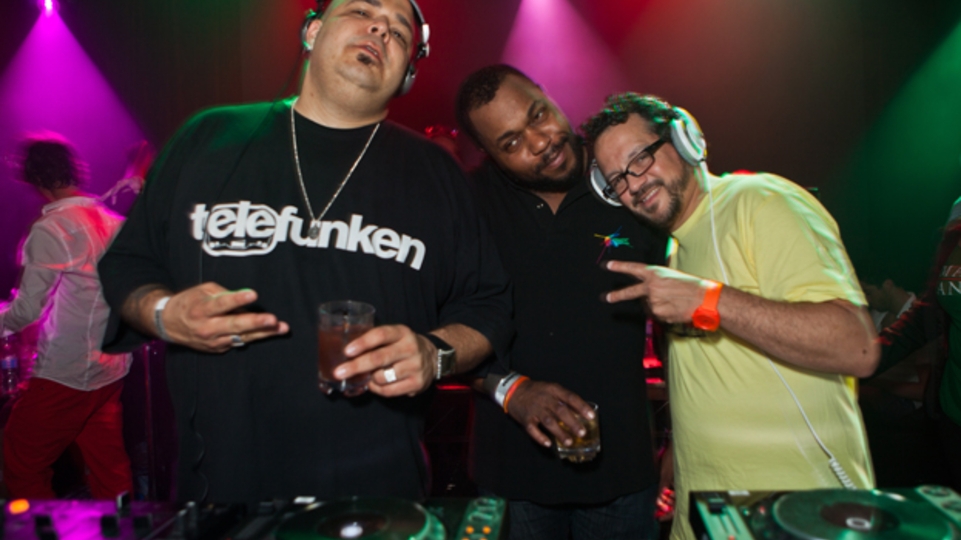
Derrick Carter, DJ Sneak and Mark Farina go way back, back to the '80s when Chicago was the planet's epicentre of house music. They were there from year zero. Carter and Farina used to share a loft in downtown Chicago, while Sneak worked across town at the revered Hip House Records store. They would eventually cross paths at a loft pary in Milwaukee, and some 20 years later they're together travelling the globe on their 'Back to Back to Back' tour, stopping in Ibiza (several times), New York, Belgium, Holland and the UK. Over the years, they've seen clubs come and go, DJs come and go, whole genres of electronic music come and go, but they endure. Mostly because they know what moves a party. And here's a clue — it's nothing to do with trends. We grabbed all three of them over Skype to get the low down on their tour, where house is at right now, Chicago's heritage, and more.
Back when house and techno were starting to gain pace in Chicago, and there were a few fewer genres of electronic music, was it easier to hook up with the like-minded people?
Farina: “Well, we didn't have all these names, there weren't all the sub-genres. It was just house and techno.”
Derrick: “We didn't have tech house. When I first met Mark, I was about 18, I'd got kicked out of college, so I started working at the record store. Imports Etc, a little shithole in the spare room of a parking garage. Imports and Loop were the two stores downtown. I managed to get fired twice from that store. It was a great place to hang out and get music. But we didn't have this bunch of genres. There was house, there was disco, there was hi-nrg. Maybe acid house. We had 'sleaze'. There was this club called The Saint in New York, and they played that. It was this kind of mid-tempo... well, sleaze. It was house, but not really house. You'd have to hear it to explain it.”
Now that you've endured through maybe 25 years of dance music and club culture, how do you feel about where you're at right now?
Sneak: “Well, I think that whole EDM thing has to be explained a little better to people. There are people like us who have been playing for 25 years in America. [EDM] is a big commercial boom. It's a bubble and it will burst, but when it does, we'll still be around because our music and our culture, it's all come from what we've been doing this last 25 years. It will attract kids that don't know about it, and it's about musically educating people. But they run into either one of us, and they're going to get a schooling that night. Then they'll want to learn who else makes this kind of music. We could be mad about it, but maybe we can just learn to be around it, maybe even capitalise on it a little bit. Because we deserve it. We put in our hours. We have our stripes.
Derrick: “EDM strikes me as being like the rave scene that we went through, but times 50. Whatever. EDM didn't make me. I was doing what I was doing before I knew that that was what I was doing. This is no newly-minted thing. We always been here. For 25 years. How do you express that to people who are 21-years-old? 'I been doing this 25 years, how old are you?', '21', 'Right, let me talk to your dad'.”
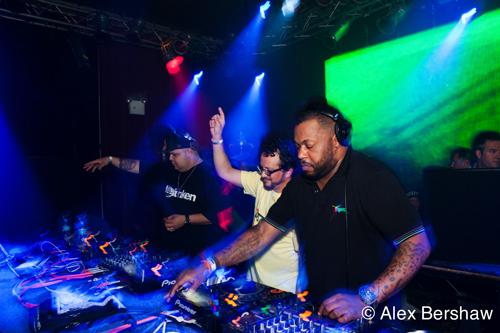
What do you think of EDM personally?
Derrick: “It's horses for courses. Do what you do, and I'll do what I do. I frame it with almost a Darwinian kind of thing, so I'm just going to do what I do, and I'll either survive or go extinct based on that. There's always going to be things I don't like. I live in a bubble. There's room for all kinds of bubbles. You vote with your McDonald's paycheck, or your mama's money.”
Having all worked in record stores, do you miss the decline in record shop culture?
Derrick: “Having a bricks and mortar store was like a chapel. You meet people, interact. It would be a social thing. People I might not speak to ever again, or ever would have, but inside that store everybody was the same. Everybody was trying to find the hot jam. Talking shit. Hanging out. Even as a resource. I'd meet people who would book me for sets. Met some really good friends. But times change. Hey, people don't go to the drive-in anymore. You just got to pick and roll.”
Sneak: “Did you guys ever buy the last three copies of a promo so that no one else could have it?”
Derrick: “Hah! I was never quite that shady. Plus I never had the disposable income.”
Farina: “I'd hide stuff.”
Derrick: “Oh yeah, I'd hide the shit out of stuff. In between old rock records. That was the good thing about record shops. You could hide stuff.”
Sure, but nothing quite beats getting hold of a track no one else has, right?
Derrick: “When I worked at the stores, someone would bring in a box of something, and they'd used their last $500 to press up this track and they'd bring in a hundred. And that would be it. There was something awesome about that. Listening to stuff on a Monday over the speakerphone so that we could order it, and it would be shipped so you could have it by the weekend. Maybe only 50 copies of a track in the whole US. You had to be there. When UPS would come, kids would be salivating. Man, I do kind of miss those days where you felt special by having this awesome piece of music and knowing there were only 100 in the world. It had an allure. A glisten to it.”
Farina: “Ha! Yeah, when those boxes used to come in to Gramaphone [another seminal Chicago store], people would be like vultures. We'd go to Sneak's store with a guy called Gemini, and he'd have jumped out of the car before it had stopped moving, so he could get in first. Music feels a little more disposable now. And good music can get lost in the shuffle. There's just so much more 'stuff'. It took effort to mail out 10 promos on vinyl, rather than just clicking your whole contacts and pressing send. We were in a small microcosm back then, where there would just be certain new cuts each week that you and only 20 friends would know were hot. Buying music now feels more like a solo project.”
But there's plus points to all that... like not having to carry 10 stone worth of records around the world...
Derrick: “USB.”
Farina: “You got to embrace that, right?”
Sneak: “USB does a great job. You don't need no sync button, you don't need no laptop, just music and a way to find it fast enough to play it.”
Derrick: “Man, I get so many people really up in arms about playing vinyl. I remember bringing a pitch-control cassette deck to parties to play stuff that wasn't on vinyl. And reel-to-reels. It's always been a matter of using the format you had the hot business on. It's just that it was usually vinyl. Maybe you don't feel like taking your four-track to the party. There were always other avenues. I like Traktor, I got a little rig. It's nice. But for sheer portability, I have a whole set on my keyring. Literally, in my pocket as we speak. That's nouveau amazing. I got 64GB of hot shit on my keys. I'm at the grocery store, 64GB of hot shit. I'm at the gas station, 64GB of hot shit. I'm at the car wash, 64GB of hot shit. Wherever I go, I got a party starting in my pocket. A party in my pants, more or less.”
Farina: “I still like vinyl, and I play it locally. When I play gigs in town and I know people have a correct turntable set-up, it's still a bit of a lost art. But I still like playing it.”
Derrick, your DJ style has always been very physical. Do you think technology takes anything away from that physicality?
Derrick: “No. I do not. I'm as tactile as I want to be. I can do whatever I want to do. I know people who love to play vinyl. I was with Cassy this weekend, and she had a big-ass record bag. I was like 'go girl, you do that'. But my back was like 'oooooh wee, no ma'am'. At the end of the day, rock the party. Whatever you do, if you bring an eight-track, if you bring fucking slide whistles and kazoos, rock the party. Whatever it takes.”
Farina: “I'd play like a whole party on vinyl, and all I'd remember is those four times the record skipped. Goddamnit! Pushing people away from the booth, you become like a turntable goalkeeper.”
Derrick: “Or like when someone spills a whole beer in your crate, and you got to sit there with a towel and mop it all up. The ridiculousness of having something playing, and someone is drunk or just stupid and wants to reach out and touch it. They want to be tactile too. Nah.”
Are there any of the new school who can party like the old school?
Derrick: “Honestly, there are some that can handle business. We were always down to have a good time. We went to parties to party. People say 'Why you turned your monitors up so loud?' Because I want to be at the party too. I'm not a social wallflower. I go out to kick it. I blow up the spot. I'm co-hosting parties that aren't mine. Buying shots. That's my personality. Because when people were out and about early days, that's what happened. A lot of DJs don't really have that bend about things. They don't go out and have a good time. They do their knob-twiddling then go home. You need people to come and play the party, not just come and play a set.”
Finally, do you guys remember your year one moment, when you realised electronic music would be your life?
Sneak: “December 26, 1983. I'd landed in Chicago. A few days later, I tuned into an all-nighter for New Year's Eve on the radio. I didn't know what it was. I didn't even speak English. But I knew that I loved this music. It was just Chicago house, DJs mixing all night. It was repetitive, and the music never seemed to stop. Then in 1991 when I first heard Mark and Derrick play at a loft party. From that point I knew I wanted to play that kind of music and be part of that culture. I was a kid, and I was like, 'holy crap'.”
Farina: “Similar to Sneak, listening to Chicago radio at home with my finger on pause. Recording the different songs I liked. I didn't like it all, I was coming from the new wave, industrial side of things. Picking out stuff like Liasons Dangereuses' 'Peut Etre Pas'. Then there was a place, the Music Institute in Detroit. Derrick, myself and Chris Nazuka went up to record on KMS. It was Derrick May, Juan Atkins and Kevin Saunderson's club, and Juan and Derrick playing there in about 1988. I remember being in that club and thinking this is what I wanted to do. I still feel grateful to this day for growing up in Chicago at that time. Before the internet, before all this stuff, you had to be in Chicago at that time to hear this music at that specific time in history.”
Derrick: “We used to have family reunions. It's a big family, so the reunions were big, like 300 people. It would be in a different place every year. I thought the guy doing the dinner dance was the coolest guy. He had two turntables and a mixer and a converted telephone that he was using as a headphone. He showed me how to do it and that was my hallelujah moment. I was playing the hot jams, and people were dancing, jumping around. I was smitten. This was my new life. Then when I was 12, my friend had a birthday party in his basement. That was the first time I matched beats, 1982 and I was in seventh grade. I mixed Martin Circus' 'Disco Circus' into Visual's 'The Music's Got Me'. When it hit and laid perfectly, I was the bomb for that whole party. Everyone was like 'yo that mix was hot!' When you're 12, that's good props. I had people bringing me punch. Whereas before that, they were 'get your own damn punch'. I had transcended. Oh! And I saw Loleatta Holloway at the Power Plant, sophomore year in high school. To see her perform live with Ron Hardy playing, was another amazing, hallelujah moment.”
